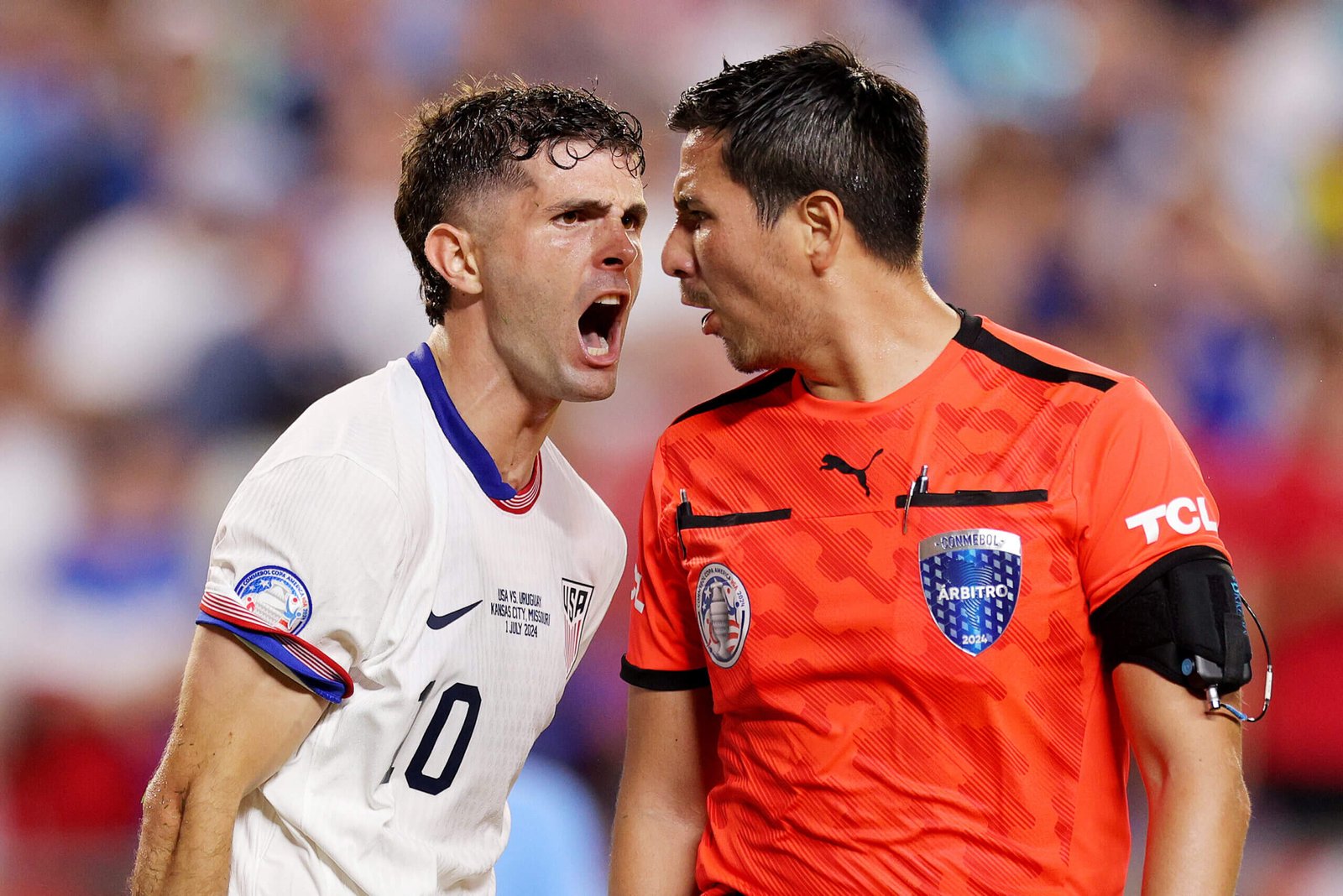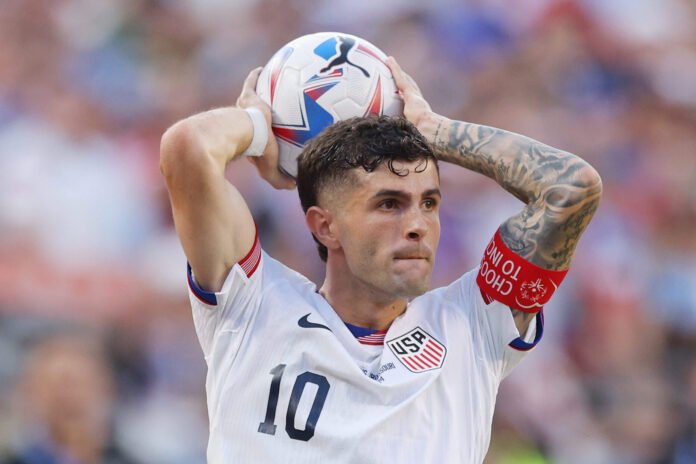Good enough to mix it with the very best and win trophies? Or not quite as good as some around them fervently claim?
Questions surround the USMNT after their embarrassing Copa America group-stage exit, but should they apply to their star man, too?
Christian Pulisic is the team’s best player, no doubt. So often he is the difference maker, the cut above. He arrived at this home tournament riding the high of his strongest individual season at one of Europe’s top clubs — scoring 15 goals and providing 11 assists across all competitions with AC Milan. His switch from Chelsea in a deal worth up to €22million ($23.5m, £18.6m at current rates) last summer proved to be one of the continent’s best high-profile transfers.
But in the main audition for the national team to prove they can achieve their strategic aims at the World Cup they will co-host in two years, both Pulisic and the wider American program gave an inconclusive response.
At least for the 25-year-old, though, it was not because he is over-hyped. In the end, Monday’s 1-0 defeat by Uruguay did not suggest he lacks the quality of players on the Uruguay team, stacked full of his peers at Europe’s top sides. Instead, it underlines a problem he faces continually: Pulisic cannot keep doing it alone.
He played his part in the U.S. team’s group-stage opener against Bolivia with that wonderful third-minute goal. Then he turned provider, assisting Folarin Balogun for the second.
It was not Pulisic’s fault that his team-mates subsequently spurned so many chances to build their goal differential in Dallas. And in their second match against Panama, he created three chances, more than any other American player, in a 2-1 defeat.
Pulisic reacts during Monday’s defeat by Uruguay (Michael Reaves/Getty Images)
Yet, in the wake of a collective disappointment, Pulisic is often the first under scrutiny. That’s what happens when you’re the best on the roster. Just ask Jude Bellingham, questioned after a lukewarm opening run at the European Championship until he conjured that exceptional moment to help England squeeze into the quarter-finals. Or at the other end of the age scale, there is Cristiano Ronaldo, who missed a penalty in extra time but then stepped up to convert Portugal’s first spot kick in their shootout win over Slovenia.
Ultimately, against Uruguay in Kansas City, Pulisic could not deliver the difference. Shifted to the right of the attack in place of the suspended Tim Weah after starting the first two fixtures on the left, there were a few characteristic early moments of class that boded well. Uruguay’s players were getting tight to him, but instead of moving inside as he did so often in the previous game, he adapted, using his pace to zip outside of his marker and threaten.
Then, circumstances out of U.S. control damaged them and him. Pulisic’s link-up with Balogun — in exploiting the Monaco striker’s pace as he had previously — was over when he was forced off injured in the first half.
Then there was the officiating. Oh, the officiating. Referee Kevin Ortega appeared so far out of his depth that urgent questions must be asked of organizing body CONMEBOL.

Pulisic shows his anger at Kevin Ortega in Monday’s second half (John Dorton/ISI Photos/USSF/Getty Images for USSF)
There was the booking for Tyler Adams for a foul when he was the victim, not the offender. Worse still was Ortega allowing play to continue as he also booked Chris Richards, offering Uruguay the chance to attack when the U.S. players had stopped. They nearly scored but for Tim Ream’s last-ditch intervention.
Compilation of some of the most controversial refereeing moments from USA’s match vs Uruguay ⬇️ pic.twitter.com/XHwv9B5YfL
— FOX Soccer (@FOXSoccer) July 2, 2024
Finally, there was the paper-thin VAR call over Mathias Olivera’s goal. Was it offside? It looked so at first. But, in the end, the officials perhaps called that one right. Just.
It did not stop a furious Pulisic at the final whistle seemingly gesturing for Ortega to join the throng of celebrating Uruguayan players. In turn, the 32-year-old official refused to shake the U.S. captain’s hand when he offered it moments later.
“Honestly, I saw things that I’ve never seen before right in front of my eyes today,” said a still-flabbergasted Pulisic afterwards. “I truly can’t believe… It’s not why we lost. We’re not out of this tournament because of officiating but really, I’ve seen things I really don’t know what I’m looking at. I don’t know what they’re calling. He gives no explanation. He’s doing things I can’t accept.”
Ortega was not the only inept referee the U.S. will rue crossing paths with in this tournament.
Against Panama, the Salvadoran Ivan Barton declined to book Cesar Blackman for a clear and damaging foul on goalkeeper Matt Turner, who later seemed impeded by a leg injury suffered in the collision. Following the foul, Turner was uncharacteristically slow to move towards that same player’s equalizing goal. Only Barton will know too why he decided to add just five minutes in the second half with so many halts in play.
To echo the captain, though, genuine hard-luck stories from officials were not the only reason for this setback. The truth is that the U.S. lacks enough strength in depth behind its starting XI — and even then, too few players are consistently capable of Pulisic’s elite level. Can they develop before the home-soil World Cup in two years?

(Carmen Mandato/USSF/Getty Images for USSF)
Pulisic, so often tasked with answering questions on the wider aspects of this program, tried to remain optimistic as he made his way to the team coach following a long wait in the random doping test room.
“We’ve got time to improve before then (the World Cup in 2026),” he said. “I think everyone has to take a step back and we need to find our identity again and find the motivation. I don’t think it’s a lack of motivation though; I want it so bad and everyone does.
“I’m not exactly sure what’s missing but I think we are on a good path and we can expect good things around that time.”
There have to be improvements. If not, the USMNT will surely fail to exploit the biggest-ever opportunity to grow the sport in North America. Other talented players billed as capable of becoming big-game changers, such as Gio Reyna, need to start doing that consistently when it matters.
Asked about claims of overall progress since the last World Cup, when the U.S. at least progressed beyond the group stage, Pulisic struggled to hide his frustration.
“It’s not for me to say,” he added. “I’m doing my best always to improve myself, as everyone in the team is.
“We didn’t get the results we needed in this tournament and that hurts, but that doesn’t mean we’re a bad team or we haven’t improved.”
Olivera y un gol fundamental para Uruguay 🙌 pic.twitter.com/D4nWtOEwGD
— CONMEBOL Copa América™️ (@CopaAmerica) July 2, 2024
Finally, there was the fate of the manager. Does he still back Gregg Berhalter to lead them forward?
Pulsiic sighed deeply. “Yeah. Look, we have a good relationship with him,” he said. “Whatever the next step looks like, it’s not my job to decide.”
If he sounded mentally fatigued at this point, it was perhaps the night’s exertions taking their toll. After the chaos of that contest, he was being asked the big-picture questions once again.
Pulisic gave the answers, as he usually does. But it’s time he got a little more help.
(Top photo: John Dorton/ISI Photos/USSF/Getty Images for USSF)
Read the full article here


